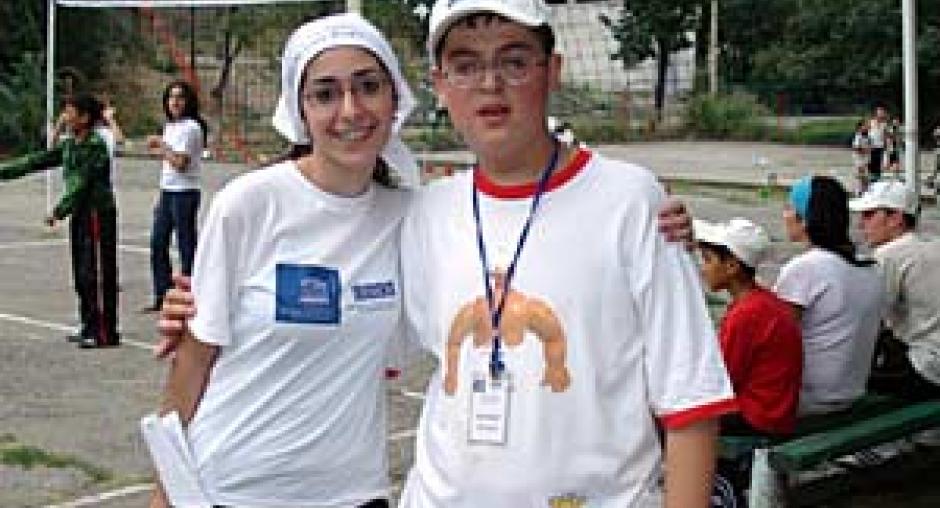Armenian aims to enhance women's economic opportunities
Sona Karapetyan, from the remote Armenian province of Syunik, believes that young people's most important task is to empower their community by participating in civic life.
"Young people now have more opportunities, like access to information, but not all of them realize this or make full use of their chances," Sona says. "Isn't it great when you not only improve your own life but can also share in improving the lives of those around you? By taking part, young people will help build a strong community and I see my role as serving as an example for others to follow."
Collecting experiences
Though only 19, Sona already has a long list of related volunteer and work experiences, such as creating economic opportunities for women and protecting the environment. She combined this work first with school and now with her studies at the Yerevan State University.
"I like to work during my vacation, and I believe that this work should be connected with the community - I need to give something to the community."
Sona says her experience at the local School of Leaders was an eye-opener for her in identifying her goals and aspirations. It launched her on her volunteer path. The School, which is organized by the Armenian Women's Association's Kapan branch to identify potential young provincial leaders and improve their leadership skills, selected her when she was just 15 years old.
There she became acquainted with the work of the local government and was trained on women's rights and women's participation in the Parliament.
Aiming for gender equality
"I joined the local Women's Association when I was in the eighth grade. I was the youngest member. That's when new questions started popping up: why were there fewer women in our parliament, fewer women in our businesses? Why do we have fewer rights?"
When she was 16, Sona traveled to the United States on the Future Leaders Exchange Program for nearly a year. On the exchange, she learned about the basics of democracy and business. She also gathered extensive volunteer experience and launched a club where students could exchange information about their cultures.
Upon her return to Syunik, she and the local Peace Corps volunteers founded a non-governmental organization, the Women's Business Society of Kapan, based in the provincial capital. Given that women represent three-quarters of the unemployed in the province, this group aims to raise women's awareness of business opportunities, develop their business knowledge and encourage entrepreneurship among young women.
Her organization's first training course focused on improving customer service at cafes. Run by women, the course focused on a predominantly female occupation - waitressing.
"There are some places where people can work, but I see that young people are afraid to apply for jobs because they don't have the requisite experience. Now that we have organizations that offer training in different fields, things have changed and people are more confident and they try to find employment in new fields."
Protecting the environment
Sona's desires to promote economic development and environmental security in the province fit well with the tasks of the recently established OSCE Programme Implementation Presence in Syunik, which focuses on the region's security-related environmental risks.
She has participated in a number of local OSCE initiatives in Kapan, such as public hearings on environmental hot spots, tree planting, training workshops and clean-up exercises.
Promoting tolerance
Sona's strong communication and linguistic skills made her a key player in the Youth Summer Camp for disabled and socially disadvantaged children, organized in August this year in Syunik by the OSCE and UNESCO. She reported on the camp for its website (see link on the right) and local media, while also sharing and promoting her ideas on youth involvement.
"Sona's participation helped raise public awareness about the camp and make it a tradition," says Garik Chilingaryan, Project Co-ordinator at the OSCE local presence. "More than that, she inspired the young participants to treat one another with greater tolerance, to protect the environment and become more proactive in civic life."
Sona believes, "A society needs to display tolerance within itself. Syunik does not have an ethnic minority, but its people still need to be tolerant towards disabled or mentally-challenged children. It is important to me to show how valuable these children are. People need to learn to see them as equals, and this was exactly the aim of the summer camp - Learning to Live Together," she adds.
Sona would like to share her experiences with fellows from other countries, to learn about their cultures and their approaches to similar community problems.
"Seeing while watching, listening while hearing, being actively involved in the life of one's own community - that's where it starts."

